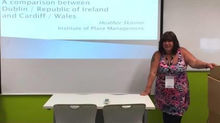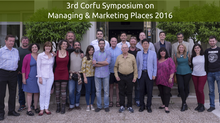Reflections on the 2nd Corfu Symposium on Managing & Marketing Places
- Feb 24, 2016
- 3 min read
The 2nd Corfu Symposium on Managing & Marketing Places took place 27-30 April 2015 at the Mon Repos Palace Hotel in Corfu Town.

At this event, it was recognized that each destination ‘needs to focus on … differentiation … define its own niche markets and serve them accordingly … in order to be able to achieve a unique “tourist product benefit” which would enable them to establish their position in the global tourism market’[1], and most importantly, achieve this in a way that means this position becomes sustainable and does not cause any further societal or environmental degradation. The Symposium heard from and visited a number of local organisations and businesses who are already attracting visitors for activity-based tourism, and attracting investment in real estate from new geographic markets[2]. Specific examples were given of the way various initiatives towards spiritual and wellness tourism are achieving success in various parts of the island, but particularly in Arillas where there is already a critical mass of such tourism service provision. A recent World Travel & Tourism Council (WTTC) report published in April 2015 suggests that a key to recovery for Eurozone countries hit hardest by the recent financial crisis, including Greece, Spain and Portugal, would be a resurgence in these countries’ tourism industries. The report also warns that these countries may not be able to keep up with other less traditional tourist destinations in emergent and faster-growing economies, unless such more mature destinations input into the infrastructure developments required to compete on a global scale. Thus leading the WTCC to place Greece in amongst the categories of countries considered ‘well-placed but with key risks’ unless these destinations build upon their strong positions, tourism quality and capacity with growth in investment at least keeping up with a growth in demand.
Although many of the papers presented to the Symposium did not specifically relate to Corfu as a destination, much of the evidence-based scientific research upon which these papers are based can indeed be applied to have a positive impact on an understanding of the island’s current situation and how best to improve the future of sustainable tourism to the island, in particular considering alternative business models of tourism that focus away from the traditional mass market product upon which the island has based its offering in the past.
There is a pressing need for tourism academics and practitioners, especially those concerned with Mediterranean destinations at the maturity stage of the product life cycle in their key source markets, to gain a deeper understanding of some of the following issues:
How the destination image is created, communicated and consumed;
How the destination is viewed by both current and potential new markets;
How both current and new tourist markets are viewed by the hosts;
How to move away from the mass tourism / All-Inclusive model towards more sustainable forms of tourism, including domestic tourism and special interest tourism
How SMTEs can leverage the advantages of online and new media to grow their businesses through disintermediating the supply chain - moving away from the dominance and control of TOs, and towards direct supply;
How best to do this in a way that preserves rather than harms the destination’s cultural, social, economic and ecological environments.
[1] Sotiriadis, MD & Varvaressos, S (2015) A Strategic Analysis of the Greek Leisure Tourism: Competitive Position, Issues and Challenges. Mediterranean Journal of Social Sciences 6(1)
[2] Ambelonas; Casa Lucia; Corfu Buddha Hall; Gouvia Marina; Green Corfu; RRL.























Comments